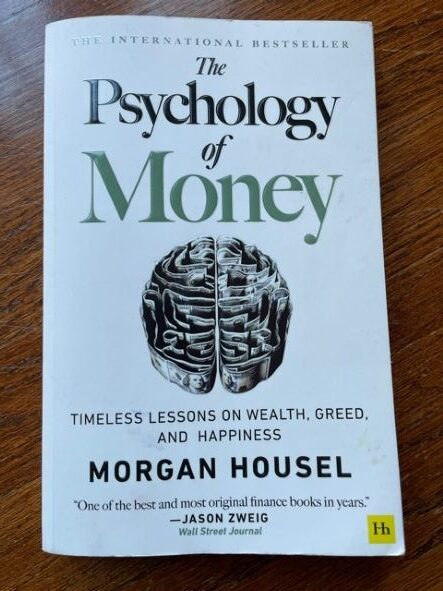Every once in a while I read a book that I think everyone should read. I know that not everyone may love it as much as I do but this year the book that I truly want everyone to read is, The Psychology of Money: Timeless Lessons on Wealth, Greed, and Happiness by Morgan Housel. (We are lucky enough to have chosen this book for our second BookChat.) I love the unique examples and illustrations that this book uses to help us learn about important aspects of financial life and investments.
This book is not academic. It is not boring. There are 20 chapters which for the most part can stand on their own and most were written as separate articles by Housel. There are SO many great quotes and memorable illustrations. There is much to learn from this book and he makes it interesting and fun.
Part of the reason I may love The Psychology of Money so much is that it beautifully articulates and supports many of my beliefs and what I have learned about money.
I love the book’s universality. I believe whether you have studied finance for fifty years or you never have, you will learn something of value and will remember it! That is what is so amazing about this book. I truly think everyone should read The Psychology of Money by Morgan Housel.
Today I am going to write about “Room for Error,” (Chapter 13 from the book, The Psychology of Money by Morgan Housel). I have referred to this concept before and I usually call it “cushion.”
The chapter about Room for Error begins by talking about blackjack players who count cards. The idea is that by counting cards you have a better idea about the probability of what type of card may be drawn by the dealer. You will not know. There is no certainty but by counting cards you can shift the probability of success slightly more to your favor. You will still lose hands but over the long run with counting cards you hope to increase your odds enough that you will end up ahead even by a little bit which in the long run will pay off. One of the key takeaways is that you have to have enough and keep enough so that you can keep playing. You need enough to get through the streaks of bad luck, you need “room for error.”
This is very much true with your finances too. You want to have enough of a safety net so that when your investments and the stock market goes down, you do not need to touch them. You have what you need in cash or a “safe” investment or even a source of income that can provide enough for you so that you don’t need to sell at the wrong time (during a bad streak). You want to be able to stay in the game, stay invested.
This must be true both emotionally and practically. If you are not able to sleep at night because you are worried about how much your investments have gone down, then you need to make a change.
If you are leveraged and taking on too much risk so that you could get wiped out with an options call, or not able to make payments on debts that you have, then you may be forced out of the game. You want to take the long view. You need to be able to withstand the ups and downs in your investments AND the ups and downs in possible income sources. You could lose your job, get disabled, or an accident occurs that unexpectedly requires a lot of money.
Room for Error can provide freedom and flexibility so that you are not “stuck” at a job that you hate or not be able to take time off to help a sick child, spouse or parent. Often money is a reason why people cannot do what they want. With savings and cushion, comes freedom and choices.
The book talks about how often the unexpected happens. Things do not usually go according to plan no matter how much we try. There are too many things we can’t know, can’t control and things are constantly changing.
One of my favorite quotes from this chapter is:
“You have to plan on your plan not going according to plan.”
This is true in both our personal lives and our finances, too.
How much room for error do you have right now?
How much room for error do you want?
The way to create room for error is to set money aside for it.
The most important piece of financial advice I have for everyone is to live within your means and always save something. Create a financial cushion so you have an emergency fund and then keep saving. As the savings grows you will have money and eventually investments set aside to provide for yourself and your family and the unexpected events that occur. Savings will provide freedom and flexibility in your life. You want to stay in the game and having savings and investments provide options. Having the confidence to know you can financially handle things is truly invaluable.


Recent Comments